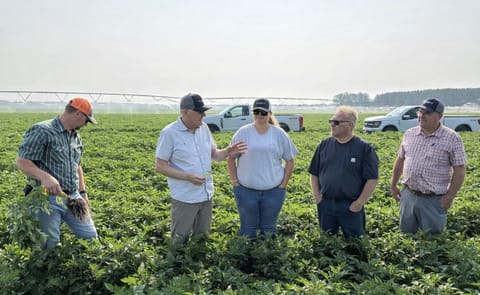A potato genetically engineered to reduce the amounts of a potentially harmful ingredient in French fries and potato chips has been approved for commercial planting, the Department of Agriculture announced on Friday.
The potato’s DNA has been altered so that less of a chemical called acrylamide, which is suspected of causing cancer in people, is produced when the potato is fried.
The new potato also resists bruising, a characteristic long sought by potato growers and processors for financial reasons. Potatoes bruised during harvesting, shipping or storage can lose value or become unusable.
The biotech tubers were developed by the J. R. Simplot Company, a privately held company based in Boise, Idaho.
The potato is one of a new wave of genetically modified crops that aim to provide benefits to consumers, not just to farmers as the widely grown biotech crops like herbicide-tolerant soybeans and corn do. The nonbruising aspect of the potato is similar to that of genetically engineered nonbrowning apples, developed by Okanagan Specialty Fruits, which are awaiting regulatory approval.
The question now is whether the potatoes — which come in the Russet Burbank, Ranger Russet and Atlantic varieties — will be adopted by food companies and restaurant chains. At least one group opposed to such crops has already pressed McDonald’s to reject them.
- News
- Food Trends
- USDA approves Simplot's...

November 09, 2014
Source
Like to receive news like this by email? Join and Subscribe!
Get the latest potato industry news straight to your WhatsApp. Join the PotatoPro WhatsApp Community!
Related Topics:
Highlighted Company
Related News

February 12, 2026
Gulfood 2026 Sets Global Trade Record Across Two Mega Venues with AED 168 Billion in Deals
Gulfood 2026 made history across two Dubai mega venues, hosting 300,000 visitors and 8,500+ exhibitors from 195 countries. Over 3,500 buyer meetings generated AED 168 billion in deals, reinforcing its status as world’s leading food trade platform.
February 12, 2026
Gulfood360 Africa Launches in Nairobi 2027, Unlocking Africa’s USD 567 Billion Agrifood Market
Gulfood360 Africa/Kenya will debut in Nairobi on 4–6 May 2027, positioning Kenya as Africa’s gateway to the USD 567B food economy. Backed by Kenya–UAE CEPA, it will drive trade, investment, agrifood innovation, and global market access across Africa.
January 19, 2026
Peak of the Market Wins 2025 Gordon Food Service Regional Supplier Partner Award for Local Manitoba Produce
Peak of the Market won GFS’s 2025 Regional Supplier Partner Award for excellence in quality, reliability, and collaboration, recognizing its efforts to supply local produce to Manitoba’s restaurants through the Markon Local brand.Latest News
Sponsored Content
Sponsored Content
Sponsored Content
Where
Sponsored Content









